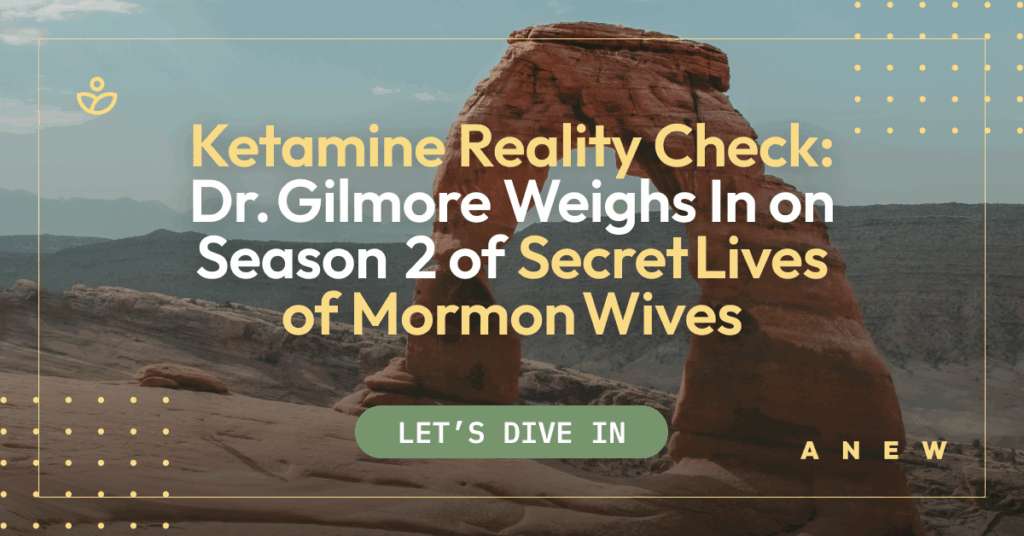Reality TV rarely pulls its punches, and Season 2 of The Secret Lives of Mormon Wives is no exception. Between heartfelt confessions and marital growing pains, the show spotlights ketamine therapy as a tool for healing past trauma. To separate entertainment drama from medical fact, we asked Dr. Gilmore—Chief Medical Director at Anew Therapy in Utah, Chief of Service at Hoag Hospital, and a widely recognized expert in ketamine‑assisted treatments—to weigh in on the series’ most quoted moments. Below, you’ll find each on‑screen line, followed by Dr. Gilmore’s evidence‑based perspective and practical insights drawn from his work at Anew Therapy’s clinic.
Ketamine Quotes and Doctor Insights
Jen: “Zac and I will definitely have a lot to work on, and ketamine therapy is supposed to reset a lot of past traumas or habits you’ve created.” (S2 E1)
Dr. Gilmore:
At Anew Therapy in Utah, we do see ketamine catalyze a “reset”, but not in the sci-fi sense the word suggests. A sub-anesthetic dose temporarily boosts glutamate signaling and stimulates BDNF (brain-derived neurotrophic factor). That biochemical shift opens a window of heightened neuroplasticity lasting several hours to days, during which old, rigid circuits can be re-patterned through psychotherapy and healthy habit practice. In plain English: ketamine doesn’t erase trauma; it makes the brain more teachable, so evidence-based therapy can do deeper work.
Jen: “I never thought we’d get to this point where we’d be doing drugs together.” (S2 E1)
Dr. Gilmore:
Medical ketamine is an FDA-approved anesthetic used in controlled, prescription-only settings. At Anew Therapy we administer it solely for clinically-indicated mental-health conditions, much the way a cardiologist might use beta-blockers. The intent is healing, not intoxication. Our patients find that reframing ketamine as a tool—akin to surgery or antibiotics—helps resolve the “faith vs. medicine” tension.
Jen: “This reminds me of when I used to donate plasma.”
Zac: “Is it too late to back out?” (S2 E1)
Dr. Gilmore:
Needle anxiety is real. The good news is that intravenous (IV) infusions are no longer the only route. Anew Therapy now favors a quick intramuscular (IM) injection—usually a single, tiny poke that’s over in seconds. For patients who prefer to avoid needles altogether, we also offer Spravato (esketamine) nasal spray, administered under our supervision. The clinical outcomes are comparable, and both options meet FDA safety standards.
Jen: “It’s hitting me right now. The room is spinning.” (S2 E1)
Dr. Gilmore:
That floating or “spinning” sensation is part of the transient dissociative experience. Most patients describe it as mildly psychedelic, lasting 15–40 minutes. In our clinic we dim the lights, provide soothing music, and continuously monitor blood pressure, oxygen saturation, and heart rate. We also have licensed therapists available to assist with navigating the experience. Because the dose is precisely titrated, unpleasant effects such as nausea or severe disorientation remain rare and are quickly managed if they arise.
Jen: “That was the hardest thing I’ve ever done.” (S2 E1)
Dr. Gilmore:
Ketamine can surface tough emotions—that’s why set and setting matter. At Anew Therapy, we model our treatment rooms after a day-spa: reclining chairs, weighted blankets, noise-canceling headphones, and a dedicated nurse within arm’s reach. Immediately post-session, patients can debrief with one of our therapists or schedule an integration appointment within 24 hours to translate insights into actionable goals.
Bret: “Does it ever get under your skin or bother you in any way?”
Demi: “I think ketamine helped me a lot with that… maybe your 40th session you’ll get there.” (S2 E7)
Dr. Gilmore:
Although this was delivered as a joke, some watchers may be unfamiliar with the length and frequency of ketamine treatment courses. A typical therapeutic course is six treatments over two to three weeks, followed by individually-timed boosters (often every three to four months weeks). Forty sessions would be unusual unless the patient has chronic, refractory symptoms and clear benefit continues. Long-term resilience isn’t from ketamine alone; it comes from the combination of transient neuroplasticity, structured psychotherapy, and lifestyle changes introduced during that window. At Anew Therapy we track mood scores with PHQ-9 and GAD-7, adjust booster frequency, and pivot to additional modalities (e.g., TMS, nutrition counseling) if progress plateaus. The goal is durable remission, not endless dosing.
Anew Therapy in Utah: Your Partner in Transformative Ketamine Care
Ketamine therapy isn’t reality‑TV hype—it’s an evidence‑backed breakthrough for people whose depression, anxiety, or trauma remain stubbornly resistant to standard treatments. At Anew Therapy, we translate that science into a calm, spa‑like experience that puts the mind at ease and promotes healing.
What sets our clinic apart?
- Expert‑Led Precision Care
Every treatment is overseen by board‑certified providers who fine‑tune dose and personalize your treatment plan. - Comfort‑First Environment
Reclining chairs, weighted blankets, curated playlists, and dimmable lighting turn the transient dissociative phase into a safe, even uplifting journey. Continuous monitoring keeps any side‑effects minimal and short‑lived. - Integrated Healing
Neuroplasticity is only the doorway; lasting recovery comes from what you do once your session is over. We pair each series of ketamine sessions with in‑house psychotherapy, nutrition coaching, and other optional treatments such as TMS to reinforce new neural pathways. - Accessible & Insurance‑Friendly
Treatment is often covered by insurance when criteria is met. Our billing team handles the paperwork so cost isn’t a hidden barrier.
Whether a TV sound bite piqued your curiosity or years of trial‑and‑error have left you exhausted, hope is closer than you think. Schedule a complimentary consultation with Anew Therapy, and discover how ketamine therapy can help you reset, rebuild, and reclaim the vibrant life you deserve.


